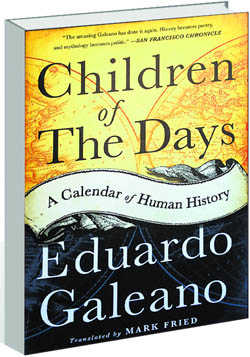
Children of the Days by Eduardo Galeano. Nation Books. Pages 423. Rs 1,080
Shelley Walia
‘If poetry is the little myth we make,
History is the big myth we live,
And in our living, constantly remake.’ — Robert Penn Warren
For most of my teaching career, I have introduced my students to the firebrand literary giant Eduardo Galeano’s The Open Veins of Latin America as one of the most seminal texts in postcolonial theory and anti-imperial history. Writing in defence of the written word, Galeano always maintained that we write, ‘out of a need to communicate and to commune with others, to denounce that which gives pain and to share that which gives happiness… One writes, in reality, for the people whose luck or misfortune one identifies with — the hungry, the sleepless, the rebels, and the wretched of the earth — and the majority of them are illiterate.’
His writings, at once comic and philosophical, follow the credo of literature as a tool for the voiceless in the midst of ‘a deaf-mute culture,’ a literature that awakens human consciousness for the need of social transformation and ethical politics.
As he said in his last lecture before his death, “Latin America is like a woman whispering in my ears.” His legendry work, The Open Veins of Latin America concerns itself with the pillage of the South American continent by Western powers supported by repressive right-wing military dictatorships, arguing that Latin American history of poverty, hunger and underdevelopment has its genesis in the western plunder of gold and sugar. Interestingly, in a lecture at an American University, he began on a rather hair-raising indictment of Washington’s role in the world, “Please don’t save us.”
As Mark Twain is remembered by Huck Finn and Tom Sawyer, Galeano is saved by his soccer commentary, poetry, cartoons and the great historical work Memory of Fire and a bracingly original book Children of the Days: A Calendar of Human History, which is closely connected to his larger concerns with human suffering and western disregard for human values through history.
The book serves as a calendar for each day of the year that draws attention to human ventures down the ages. A compelling and original work of history, it resounds with pain and injustice, with black comedy and humanism.
Though it is not a linear narrative, it weaves its way in and out of a compendium of heroes and their lives, of the dark events that we humans have experienced. Unheard of incidents such as the Brazilians who demonstrated against the ban of kissing in open spaces by having a ‘smooch in,’ the walking library of Abdul Kassem, the Vizier of Persia consisting of 1,17,000 books aboard 400 camels, all for the reason of safeguarding knowledge from plunder and vandalism: These stories emerge from his incisive sense of perception and an abiding belief in the trenchant sense of justice.
The entry for February 29, for instance, reads, ‘In routine fashion, Hollywood gave nearly all of its awards, eight Oscars, to Gone with the Wind, which was a long sigh of nostalgia for the good-old days of slavery.’ The death of Winston Churchill on January 24 angrily underscores his statement to the British Air Council, ‘I do not understand the squeamishness about the use of gas…I am strongly in favour of using poisoned gas against uncivilised tribes. The moral effect should be so good… and would spread a lively terror.’
Costa Rica’s President Don Pepe Figueres’ statement on December 1, ‘Here, the only thing wrong is everything’ brings home the inhumanity of the human race. Galeano’s damnation of history fascinates as well as uplifts. The indefatigable writer remains unafraid to speak out on what he saw, always looking at the present through history with the reflection of humanity and fortitude of spirit.
These vignettes, at once funny and moving, unfurl the major historical concerns we so easily identify with and yet many that we have no memory of. Each story gets its inspiration from the historical event that took place on that day of the calendar year. These simple stories of simple people have to be recounted to us readers who need to be reminded of our amnesia of history. Though untold, Galeano hesitates to call the despised people of history voiceless. ‘Everyone has a voice,’ he asserts. This idea resonates through his short stories, an original experiment in minimalism that resounds in Mark Twain’s dream, ‘If I had time, I would write shorter stories.’ The stories are indeed sharper and shorter than any that I have read. And they reanimate the past.



























